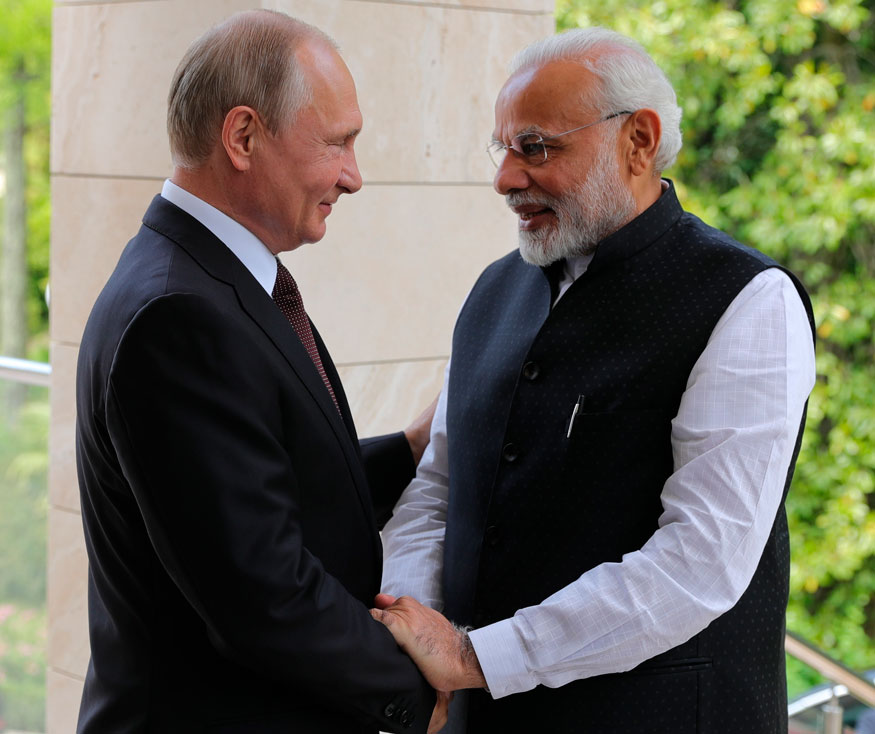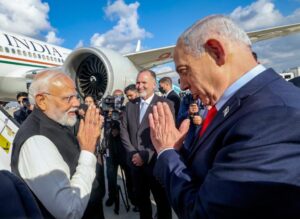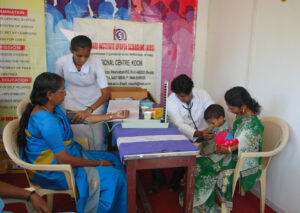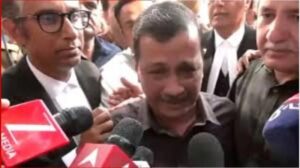How Russia Has Quietly Built Its Allies Since The Cold War

FILE PHOTO: Russian President Vladimir Putin greets Indian Prime Minister Narendra Modi during their meeting at the Black Sea resort of Sochi, Russia in April 2022 (AP)
Despite widespread sanctions over the invasion of Ukraine, Russia still has many allies. This is how Russia built relationships from the ashes of the Cold War.
Two weeks after invading Ukraine, Russia expanded its list of “unfriendly” countries to include 48 nations that had imposed sanctions against it for actions in Ukraine. The initial list, published in 2021, contained only two countries: the United States and the Czech Republic. Expanded in March 2022, the list now includes the United Kingdom, Australia, Canada, Japan and all European Union member states, among others. Being on the “unfriendly” list means restricted trade relations and currency transactions with Russia.
While Russia imposed restrictions on economic cooperation with these “unfriendly” nations, it has intensified its cooperation with China and India. On 30 March 2022, Russia’s Minister of Foreign Affairs, Sergei Lavrov, visited Beijing and said Russia–China relations were “at their strongest level ever”. The countries released a joint statement on their strengthened cooperation.
India has remained committed to its cooperation with Russia, refraining from criticising the invasion in Ukraine, exploring new payment models for trade, and purchasing liquified natural gas from Russia at a discount. The war in Ukraine demonstrated that the global order the world has known since 1991 has been altered: multipolarity – a reality in which there are multiple centres of global power – is the new norm.
Western countries could not get the full condemnation and isolation of Russia they hoped for, and the more strongly they pushed for condemnation, the clearer it became that major powers such as China and India could not be forced to choose sides.
Since the Cold War, Russia has cultivated multiple allied relationships that have proven useful. While its engagement in traditional security alliances has been limited, Russia has experimented with a range of cooperation formats.
Disillusioned by the promise of allying with the West, Russia’s leadership in the late 1990s shifted towards multivectorism: the idea that a country’s geopolitical standpoint can be favourable to all of its major partners, benefiting economically and militarily from these partnerships, with the goal of creating a multipolar world order, without US hegemony.
Russia followed two pathways. Regionally, it aimed to strengthen its influence in Central Asia, the Caucasus and Eastern Europe, creating a defensive alliance and economic-union-type relations with former Soviet countries. Globally, it sought to increase its bargaining leverage towards the US and diversify its foreign relationships.
At the regional level, the only formal alliance that Russia is part of is the Collective Security Treaty Organization (CSTO). Policy documents treat the CSTO as the main tool for managing regional military and political threats in Eurasia, but Russian scholars don’t see the CSTO offering Russia support or “pseudo-legitimacy” during its military actions (for example, those in Georgia or Ukraine) comparable to the support the US receives from NATO. Nevertheless, Russia remains the CSTO’s guarantor and the main contributor to its budget.
Beyond security-focused alliances, Russia has put its energies into creating and sustaining regional union–type relationships, including the Union State of Russia and Belarus, and the Eurasian Economic Union. The former is a union characterised by economic sovereignty, emphasising loyalty and common defence with Belarus, Russia’s closest ally. The latter is a regional integration project involving Armenia, Belarus, Kazakhstan, Kyrgyzstan and Russia.
The Commonwealth of Independent States has also been used as a political platform to address regional issues. The fate of these Russia-championed regional organisations is yet to be known, given their main security guarantor (Russia) has disrupted the global status quo by invading Ukraine as well as through its actions in Georgia and Crimea in 2014. This has left some Central Asian countries concerned about Russia’s next moves.
At the global level, a multivector approach has offered Russia more leeway in its negotiations with international partners. Russia has also diversified the tools it can use in times of crisis or when faced with sanctions. When relations with the US and the EU deteriorated, Russia’s multivectorism allowed it to adjust and pursue its goal of being a global power. Russia has been cultivating strategic partnerships with countries in Asia and Latin America for decades, experimenting with more informal, flexible and geographically diverse security relationships that come without the defence commitments of traditional alliances.
Using a strategically deployed partnership framework, Russia has created a new world order oriented around more than one centre. This framework comprises bilateral strategic partnerships (the closest partners being China and India) and multilateral strategic partnerships among the BRICS countries (Brazil, Russia, India, China and South Africa).
Russia places special weight on its strategic partnership with China. Russo-Chinese relations evolved from being framed as “constructive partnership” in 1994 to “comprehensive strategic partnership” in 2019, with Russian President Vladimir Putin even acknowledging that an eventual military alliance with China could not be ruled out.
Much of Russia’s security thinking and policymaking has been a response to NATO’s existence as a security alliance in Europe. Even though in the early 1990s Russia and NATO engaged with one another through various institutional mechanisms (and there were even discussions that Russia might join NATO one day), collaboration deteriorated over time because of the Russo-Georgian war, and Russia’s engagement in Ukraine in 2014 and today.
Russia’s national-security strategies have consistently treated NATO expansion as a major threat. This threat is likely to remain. Finland and Sweden formally applied to join NATO, giving the Western alliance its biggest presence along the Russian border in its history.
Russia declared it would take retaliatory steps in response to Finland’s intention to join NATO. In the short to medium term, being isolated from the West and facing economic sanctions and military expenses, Russia has fewer policy options in the international arena. It is likely to strengthen its relations with China even more, though Moscow is wary, as it does not want to be perceived as a junior partner in a potential Sino-Russian alliance.
China is Russia’s main economic partner, and there is a significant imbalance in their economic relations: China accounts for around 18 percent of Russia’s total trade; Russia’s share of Chinese trade is only just over 2 percent. This imbalance will increase if the war in Ukraine continues and economic sanctions are maintained.
Russia is likely to continue its anti-Western pattern of international behaviour, and its isolation from the West may outlast the war. If it wants to energise its foreign engagements, Russia will likely deepen its bilateral relations with its closest regional allies (Belarus, Kazakhstan), as well as use its relations with EU countries such as Hungary, France and Germany that may be more susceptible to its influence. However, as Russia keeps stacking up unfriendly countries, its relationships with China and India will show whether it can sink or swim in the multipolar world.
(Originally published under Creative Commons by 360info™)





